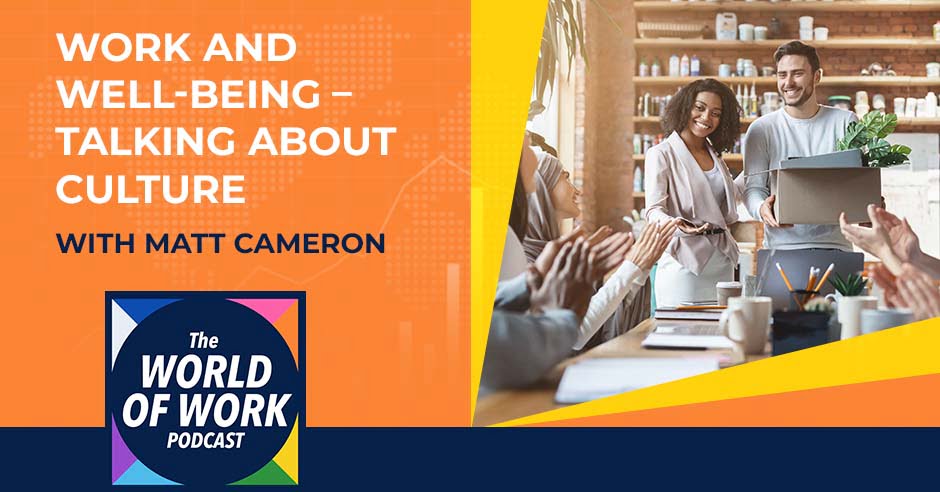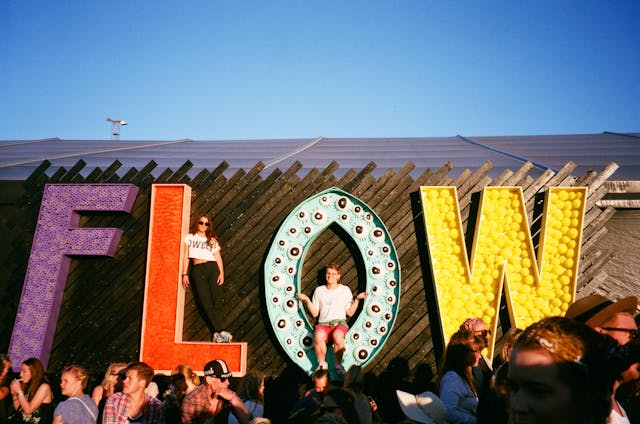
Unlock the power of a positive work culture! Explore the intricate relationship between work and well-being as Jane Stewart talks about culture with Matt Cameron, an employee retention performance and well-being consultant. Matt offers valuable and actionable strategies for creating a thriving workplace environment where everyone can flourish. Don’t miss this insightful discussion that promises to inspire positive change in your workplace culture.
—
Listen to the podcast here
Work And Well-Being – Talking About Culture With Matt Cameron
Before we get into this episode, I want to remind you of all the really great stuff on our website at www.WorldOfWork.io. Every day, you can check out all the online seminars and workshops we’re doing as well as our team development programs. You’ll also find articles on topics to help you thrive at work. Now, let’s go on the episode.
—
Introduction
Have I got a treat for you? As always, this is one of our guest episodes that we’re sharing during the season and I’m excited to introduce this guest for many reasons. One is because he’s local and therefore, I have actually met him in real life. How often does that happen on the show these days? More importantly, because we were both speaking at an event a little while ago and I was so struck by what he shared that I forgot what I was meant to be presenting. In all honesty, it was quite difficult to follow. I’m excited to share this conversation with you. Without further ado, Matt Cameron, welcome to the show. Would you like to introduce yourself to the audience and tell us a little bit about you and your work?
Amazing. Thank you so much for having me and for the really lovely introduction. Those are really sweet. Thank you. Yeah, my name is Matthew Cameron and I am an Employee Retention Performance and Well-Being Consultant, having launched my own startups previously. I now collaborate with businesses to enhance organizational success and employee experience by creating environments that nurture employee fulfillment. Amazingly, increasingly, a lot of business folks are seeing the benefits of well-being and work-life balance, which is absolutely fantastic.
I find many well-meaning companies tend to prioritize giving people the tools to improve their lives outside of work, which, of course, is important. Instead, I focus on empowering leaders to create a fulfilling work experience that goes far beyond the typical financial rewards and benefits. This will also impact someone’s life positively and negatively, impacting the business’s productivity and retention. Ultimately, at the end of the day, their profits sometimes consultants a bit of a vague term, so I run workshops say speak on panels like we did together. I do some keynote talks and I got businesses and their cultures forward.
Those of you reading will absolutely be familiar with the World of Work projects, ambitions, and what we’re trying to do. Therefore, you’ll be completely unsurprised having heard why we’ve invited Matt to join us on the show. We know this stuff is hard, and the more people we can hear from and talk to about what they’re doing with organizations, the better chance we’ve got to give all of you and for us to make better workplaces for people and make work work for us more often and in more places.
Matt’s Journey
I think it would be fair to say that whilst we’re both based up in Edinburgh, we’re both passionate about this from a national and even from an international perspective. This is not a unique problem in one place. I’m really excited to talk about it. If you’d be comfortable, I’d love you to share a little bit with the audience about why you particularly care about this topic and why it’s so important to you that you’re spending your effort and energy helping others to address it and prioritize it.
Yeah, not a problem whatsoever. It’s been quite the journey to get here. If you’d asked me several years back if this is what I would be doing, I probably wouldn’t have believed you because my background is actually in the hospitality industry. My my working life started in roughly 2006, washing dishes. I was never paid legally. I was trained and yelled at and it was awful. We probably do an episode on that experience in itself, but I vowed to never work in hospitality again after that experience. Long story short, after a bit of a break, I found myself back there, maybe to be a bit closer to my brother, who’d been overseas for some time.
I fell back in love with the industry, people, and places I was doing, like the creative side of things. I worked my way from bottom to top in both bars and cafes on both sides of the world back in Australia in Brisbane and over here in London and Edinburgh, leading teams writing menus and serving customers. Hospitality has been really good to me until it wasn’t.
That’s where my story gains momentum to end up talking to you with the series of events that reach its climax on the second of January 2019, which was actually the day that I planned to end my life. There is a particular bridge in Edinburgh, Dean Bridge, I’m sure you are all familiar with it, that I would often walk to whether that was on my way to work, the day off, or just going for a stroll. I would walk below it and look up and wonder what it would feel like to take that step off or how long it would take for anyone to find me.
It was a process over several months where I was becoming more comfortable with, potentially making that decision and making that final choice. When that New Year’s came around that year, I was sitting at a bar. I was drunk and alone. While everyone else was around me and they were celebrating and planning their next year and what they were going to achieve what they were going to do, I made the decision that this was going to be one of my last days on this Earth.
When that day came around, when the second came around, I was sitting on the edge of my bed and I’d already tied up one of my boots that morning to walk to Dean Bridge when something stopped me. I had a bit of a moment and whatever we want to call it, whether it’s enlightenment or just authority, was a curiosity. It’s something that defines my existence just being curious.
Something happened in that moment and ever since then, I’ve been on this journey to first improve my life but to understand what happened and how I can use that to help others and prevent them from ever reaching up point that I hit in my life. What makes me unique in this space isn’t that I’ve spent decades in HR or developed some amazing procedure that revolutionizes culture.
It’s that I was once the person that businesses put systems in place to protect, optimize, and retain and I fell through the cracks. I very nearly lost my life. With that story, it’s quite obvious why I’m doing what I’m doing, how I ended up here and why this is so important to me, but that’s something I haven’t told you yet. That’s that, at the time, there was nothing majorly wrong in my life. There were no big breakups, trauma, or deaths in the family. These things that we commonly talk about as triggers to end up at that point.
There’s no history of major mental illness apart from mild doubts of anxiety in the past. Yet, I still found myself there. I still found myself on the edge of my bed that day. To be honest, I didn’t really understand it. I didn’t even know I was getting to that point. It sort of just cropped up. I thought maybe I was weak or I couldn’t handle it. I couldn’t handle the stress I wore as a badge of honor previously and had already implemented the things I thought I probably should have been doing at the time, the common conversations around improving well-being.
For me, that’s a bit of a problem I have with this simplistic view of the world life balance. My life outside of work was just fine. It was the work that was making me quite miserable. I did play a part. I began drinking quite heavily and I wasn’t taking care of myself. I wasn’t sleeping properly. I wasn’t taking care of myself, but I’ll be spending 8 to 10 to 12 hours a day very much in this environment. A series of events led me to end up in that space and it took me quite a long time to reflect and understand what had happened, but I now use that story and my journey to help others and to draw the link between work and life and how work can impact our lives.
While my story highlights the extreme negative effects that what can bring to someone’s life, it can also bring a lot of joy and many positives to people’s lives, too. When people are having those positive experiences at work, more often than not, the business is thriving as well. That’s why I’m passionate about what I do is creating environments for both people and businesses both win.
Factors Creating Negative Experiences At Work
Thank you for sharing that and the positive I take from all of that is that for you to still work in this space, you must believe that it can get better. Otherwise, what’s the point? With that in mind, what do you think is creating these negative experiences we’re having at work? What are the factors adding to taking a workplace from a place where we’re like, “It’s not right but everything’s fine,” to actually quite a negative experience of work?
I do love this question because I’m asked it quite a lot and people often expect me to jump to very specific things and point out very specific factors, leadership style, stress, or workloads, but I always tend to jump to a bit of a higher level conversation that ties into all of those specific factors. I think it’s a lot of people don’t really understand what contributes to a positive work environment. If you don’t understand that side of things, how do you create one that isn’t average at best, and then people are turning out to this environment every day where they’re not getting too much out of it?

Work And Well Being: A lot of people don’t understand what contributes to a positive work environment. If you don’t understand that side of things, how do you create one that isn’t average at best?
Potentially, a lot of businesses think of the positive experience of the long lunch or table tennis or staff drinks and a Friday night, but it runs deeper than that. It runs into the very foundations of who we are as people. Also, a study I always like to bring up happened at Harvard I believe in 2011 which took the diary entries of 238 people. I believe there were roughly 12,000 diary entries. I was trying to find out what the key indicator of a good day at work was and it was progress. It was just making a step forward each day.
If you don’t know what that positive experience is or where people are trying to reach, how do they make progress? That ties it back into the leadership style, the communication, the stress, all of these things that are influenced by that work progress, and all these other higher-level conversations. Let’s use the example of a raise. Everyone always focuses on the money, which is obviously amazing. We all want a little bit more money, but a raise is more than that. It’s a recognition of our hard work. It’s the sign that we have grown professionally, that we focus on the money, but there’s a lot more to it than just that people say, “I deserve a raise.”
They don’t say, “I deserve more money.” It’s a feeling that they’ve grown and that they should be recognized for that growth. Obviously, the money helps, but there is that internal drive to be better and a disconnect then comes with leadership style and communication when there are different opinions there. Maybe there’s a conversation that needs to be had, what they need to achieve to get that promotion or why they’re not getting it and then that dives a little bit deeper. To loop back around, when we understand our people, we can look at those individual experiences, those negative experiences if we’re going to use that term, but until we understand what drives people, how do we know what a negative or a positive experience is?
There’s a lot more to a raise than just people saying, “I deserve a raise.” It’s a feeling that they’ve grown, and they should be recognized for that growth.
I think readers who are familiar with some of our past catalog and path guests will recognize a little bit in what you’re saying from some of the stuff we’ve done with Dr. Kevin Teo around well-being. We’ve talked about this idea of organizations getting a little bit overly focused on secondary and tertiary interventions. The reactive stuff. Everyone’s busy, everyone’s stressed. Let’s make sure they’re having and I’m sorry, I love yoga, but I’ll use it as an example, but let’s have yoga at lunch available or head massages or go and walking meetings or whatever it is.
Actually, not enough time is spent on the primary interventions, which is the proactive work creating a good experience. Is it, I don’t want to say stress-free because a small amount of stress is helpful for us because we get progress, but excess stress. In our experience, we are creating experiences that don’t have excess stress.
I think certainly for me, just listening to you talk, it’s like I don’t know how we reframe the conversation yet. I don’t know how because I feel like a lot of the work we’ve seen around well-being has gone so far down that road that I almost don’t know how to bring people back to the, “Can we just talk about your basic work design, your rotors? Can we just talk about your shift patterns? Can we just talk and shift patterns as a classic within hospitality?”
There are some basic work design stuff that we have not talked about like, does it ever occur to you that you’re just not allocating work in a way that is allowing people to feel that they are making progress? I think what’s really interesting about what you say is we work quite a lot with small organizations scaling, organizations and also the charity sector. We’re definitely seeing that issue around, “I don’t feel like I’m making progress. I feel like there’s no journey of my work that I meant to be moving forward through.”
Have Workplaces Fundamentally Changed?
As you say, I can see how that progress piece could start to become an insidious problem within a team. If no one feels like they’re moving forward, what on Earth are we doing apart from taking a paycheck? When we’re talking about different issues, we ask the question quite a lot of people: do you think this is a new problem? Do you think this is something that is getting worse? Do you think the workplaces have fundamentally changed and it was all okay before? What’s your perspective on where we are right now and compare it to where we were?
Do I believe what places have changed? I’ll say yes and no, which is quite vague, but I believe workplaces have changed, especially with technology coming in. The foundations of what work is has definitely changed. AI may have some words to say in this in the future, but what hasn’t changed is people. People are the foundations of what we do in business and every workplace in the history of man has had people. There’s a great Simon Sinek quote, “Every employee is a person.” All employees are people or customers of people all investors of people.
If you don’t understand people, you don’t understand business. People are still there. With that as well, people have also changed. The well-being and mental health conversations are louder than ever. That’s never been more talked about. Work is increasingly a bigger part of our lives and identities, blending into our vision and goals. If it doesn’t align, we’ll look elsewhere. We’re seeing more people change jobs than ever right now. My generation is the most jumpy of all time so fast.
That’s happening, but I saw a really interesting study that came out of Indeed that 93% of 18 to 24-year-olds were okay with ghosting an interview. They were okay with just not turning up. I found this quite fascinating. It’s going back to have workplace has changed like yes and no, but people definitely have. I think the workplace needs to change with them. They quoted, I believe his name was Ricky Martin, great name, winner of The Apprentice who now runs a recruitment firm. He essentially said that people were turning up and asking what the business would bring to them rather than what they would bring to the business. I find that’s really interesting.
It’s not just about money and what you can bring to a business but what a business does to align with your values, and goals, and what it brings to your life outside of a paycheck. You went into a little bit of a rant of back in my day, but we’ll skip over that one. I think we need to understand what is driving people better and the workforce only going in one direction. It’s only getting younger.

Work And Well Being: It’s not just about money and what you can bring to a business but what a business does to align with your values and goals and what it brings to your life outside of a paycheck.
The better we can understand them, the better we can drive our workforce forward. What are we offering people? What’s our value proposition? What are you bringing people outside of that paycheck? It’s so important. No matter what kind of workplace you are, whether you’re in person or online or hybrid or have employees all over the world, understanding those people and what you can bring to them is instrumental in building a strong culture and a strong business.
I think like for me, we talked about a lot with people. We try and shift organizations, particularly leaders’ views around recruitment and retention, around the idea that it is an exchange. People will be very bored of me talking about this, but I will continue to bang this drum, which is that you are quite literally in a negotiation in exchange for selling your labor, effort, energy and skills in return for a wage, benefits and an experience of work.
It baffles me that that doesn’t get listed. My favorite thing is Dan Pink’s phrase, “Pay people enough to take the issue of money off the table, and then think about what the work is.” The work is like the people you’re with, the work you’re doing, the environment you’re in, the experience of it. If the net exchange is negative, like you’re paying them all this money, but they’re unhappy and it’s not well organized or it’s not able to give them some sense of purpose or progression, that exchange is not a good one.
This side is this really weird thing and it’s a hierarchical capitalist thing like, “Let’s try and get as much out of labor as possible and we pay you.” This idea that you wouldn’t in an interview ask these questions. It’s just as you say it, I had a conversation. Someone was really put out that they were like, “What can I expect from you in terms of support as a manager?” They were like, “How dare they ask that?”
They’re about to make the second biggest decision aside from getting married and having kids and buying a house, the job you have is so formative on your life. Of course, they should be asking those questions. They don’t get that time back, by the way. I don’t get the decade back when I worked for X organization or Y organization. It better be good for me. It better be something that gives me something beyond the bare minimum surely. Readers, you know that’s a rant I go on, but it’s really important when I think.
Talking About Hospitality
In your very beginning intro, you were talking about hospitality and I have worked in hospitality on and off in my career everything from collecting glasses through to being management in the back office type roles. What’s different about hospitality do you think? Do you think it’s any particular kind of problem or challenge in hospitality? Do you think it’s a different challenge? What are your thoughts on how that shows up?
I find it fascinating. It’s an almost 24/7 workforce. It almost never closes. It’s got high stuff shortages currently, which is very problematic. I think those are the perfect storm over the last few years here in the UK that’s left roughly 100,000 jobs empty. It’s high-stress and high-paced. A lot of businesses expect you to be resilient to that without having much of a reason to be. What I find super interesting is that often don’t have the time or budget to improve the situation. If you don’t have the time, if you’re always open, if you’re open seven days a week sometimes, twenty hours a day, how do you stop, take notes, and reset?
What I find so fascinating is especially with the low budgets, it’s got to be a people-focused solution. You need to focus on the leadership and the culture because those are the people you are working with and seeing all day, every day and spending the majority of your time with. It’s fascinating because it can’t stop. How do you find a solution in an industry that’s always moving forward?
You need to focus on the leadership and the culture because those are the people you are working with, seeing all day every day, and spending the majority of your time with.
I’m speaking as we are like in the UK. I’m going to speak very specifically about the UK here. I would like to think it’s relevant to people reading elsewhere. I am fascinated by our obsession with talking about office-based workers or desk-based workers. If you think about remote as well, I know there’s a huge variation of the hours people work and stuff like that who are predominantly a Monday and Friday night culture. When I think about what health care, for example, have been through and you talk about that sort of 24 hours and I know officially certainly in the UK officially, then it’s just only half 24 hours it’s not 20, but it is.
That’s the function. The organization as a whole is open. It’s not like they shut their doors. They’re on shifts and they’ve got loads of different competing challenges and they’ve got different roles within that. I don’t know how you carve that out. My experience of working in hospitality was exactly as you described. At the time, I was pretty resilient. I had all the privileges that go alongside not worrying about keeping a roof over my head when I was there because I was this Mom and Dad’s spare bedroom and I didn’t have all the pressures.
It was relatively easy for me to be listened to. Even then, if you couldn’t keep up, if you couldn’t maintain a relatively healthy environment, relatively healthy disposition, if you couldn’t make your shifts, things like that, you weren’t that perception of a good worker. I think when you combine that and healthcare, it is very different. It’s much more regulated. At the same time, anything that involves actual shift is present, like where the work has a time when it needs to be done, it’s just different.
I think the other thing that always strikes me, and you and I have both talked quite a lot about scaling organizations, particularly the tech sector, is how those organizations exist differently They don’t exist against all the literature, all the research, all of this stuff is around. It’s in a 9:00 to 5:00 and not all, but a huge amount of it dominates around our work experience. Whereas my experience of places like healthcare, particularly healthcare and particularly retail hospitality and a little bit retail, your social environment is much more complex.
You’re working shifts quite often. I’ve never been closer to my work colleagues than when I’ve worked in those two industries because no one else is off at the same time as me. No one else is doing the Monday morning. Weirdly, I’ve never had more friends who were either stay-at-home moms at that point in their career or carers or were working in similar industries because when you finish work at 3:00 in the morning, who’s around because when you’re ready to go home?
Culture, Leadership, And Progression
I think that they can compound it because you don’t have that. You can have a great work-life balance, and definitely, we see in the scaling tech. They are so immersed in the world they’re living in that it’s all fine when everything’s good, but if it’s not good at work, then it’s not good everywhere in work because it’s kind of in sort of everywhere in your life. You got fingers everywhere and what’s experiencing. We asked this question quite a lot and we love this question, which is what would you like to be different?
It’s a bit of a lofty goal, but I’d like culture and leadership and progression and progress to all become a part of the well-being conversation feels like sometimes they’re out of a culture conversation. It’s a completely different sector of the business that looks at it, but I think happiness at work and well-being and work-like balance sometimes can be a bit of a term, for lack of a better phrase, it’s nice to have rather than needed. Work is a big part of our life. It’s a big part of our life, our well-being, and the diary study I mentioned before, like making progress is impacting our life inside and outside of work.
You’re spending 8, 10, 12 hours a day somewhere, and if you leave and you get home and you feel like, “I’ve had a day,” that day happened but nothing happened. It’s another day in our life that will never get back. You mentioned you never get those days back. I think it’s just being happily engaged in what you do and just understanding that and knowing that work does have an impact on people’s lives. It can be a positive or can be a negative and the businesses you turn into a positive, they’re going to be the ones succeeding.
Not sure if you had this, but when I was working in hospitality, there was a phrase like, “Leave your problems at the door.” No matter what happened, you walked in and you smiled and you gave everyone a great experience no matter what was happening outside of work, but did it ever work the other way around? No. When you leave work, do you just leave work at the door? No. I think it’s about unfair exchange. If businesses expect engaged, passionate employees, then expect them to switch off the moment they leave work. The two don’t mix. For you to be passionate about what you do, you probably are going to take it home with you a little bit.
It is a part of the same conversation, but that link is somewhat missing in a lot of conversations. I don’t think all work should be fun, but that’s not the point. It’s about working towards collective goals and creating a great team that all work together giving people the autonomy to shine and giving them some purpose to work towards and a community of like-minded people. It’s building trust, building that drive that people are feeling like what they’re doing on a day-to-day as what they’re contributing to that work. I would love for that link to happen. I would love to be a part of that. I hope I can one day.

Work And Well Being: It’s about working towards collective goals, creating a great team that all work together, giving people the autonomy to shine, and giving them some purpose to work towards a community of like-minded people.
I was thinking about how tricky it is with those kinds of roles to create that transition time that we know is so powerful. I was just thinking, as you were talking about leaving it at the door, the emotional labor of putting a smile on your face behind a bar and motivating a crew if you’re leading it like a team leader or something when you’ve got stuff going on, it’s so difficult. I was thinking about it’s similar with healthcare. I understand there’s a massive cost involved, but we do not give people enough transition time and you have to surely have to split the difference a little bit.
Surely, you have to say, “You do a little bit of the transition and we’ll give you a little bit of space at the end of your shift or the beginning of your shift,” just make that processing. Whether that’s for a ten-minute personal chat with your boss or whether that’s a chance to shake it off and have a chat with your colleagues and have a cup of tea, give them that space to make the navigation through rather than just demand. You’re right. I’ve totally had that. I’ve totally had it a million times. Leave everything outside. Be Jane, the person working here. Be Jane, this isn’t safe.
Don’t be bringing all about stuff in here. Don’t be chatting about it. Everyone can see. Customers can see. If you area all having serious conversations even in the tea break, put your jumper on and don’t be wandering around having a miserable face on you even when you’re like on your breaks. That’s the reality of what you hear. You’re like, “Remove yourself. You’re a misery.” I think that emotional labor is a lot. It probably compounds the issue. There are definitely organizations wanting to be better at this.
There are definitely leaders wanting to be better with this. We know this. We talked to them. They’re the ones that are listening. They’re the ones that are coming to you and saying, “What should we be doing?” They’re listening to your talks and going, “I want to be better at this.” What stops them from getting it right? What is it that’s getting in the way of us just being better at this?
Improving The Narrative
I think we’ve both touched on the side of it at different points in this conversation so far, but not jumped too deeply into it. I think the narrative around how we improve it needs to improve. The solutions currently suggest that work in life or two separate things and focus on improving life rather than work. They’re not going to be overly effective in improving productivity, retention or happiness at work. You and I both talked about an Oxford study recently from Doctor William Fleming about the individual level mental health and well-being interventions and their effectiveness in the workplace.
We’re talking about things like resilience training and mindfulness and well-being apps and their effect on making the workplace happier. These are the things that businesses are spending lots of time and hundreds of millions of pounds on each year. Effectively, the study came out and said they were somewhat irrelevant and ineffective. That’s where the narrative is being. It’s like these other things we should be doing. These studies come out and say, “Actually, they’re not working.”
There needs to be an integrated approach that looks at both the work environment and people’s life environment. I think I mentioned resilience training and mindfulness and well-being apps and gym memberships and you mentioned yoga earlier. All these things are fantastic. This is not me saying that they are ineffective at doing things, but you’ve got a toxic work environment that you’re in for 8 hours and 12 hours a day, you’re probably more likely to reach for the bottle of wine than you are meditating at the end of a long day. It’s not something that’s going to fix that environment.
I think we need to reshape the conversation into more about who you are versus what you give. It doesn’t need to be about the money because when it is you lead to the people without the budget thinking they can’t do anything. People who do have the budget spend the money and feel like they’ve done their bit without actually digging into the real people side of things. They’ve done all the things and given all the things that people say they should, but then they’re still dealing with a disengaged workforce because they haven’t taken that time to dig deeper into what makes their people tick.
I think I might be able to get some of the answers, but I’m going to ask anyway, just in case. You’re sitting there. You’re exploring this. You’re seeing it up close with organizations. People reading want to be better. There are people reading thinking, “I want this to be a better situation. I want my work to be more healthy having a better impact.” What would your advice be?
Are we talking about managers or people in the workplace? What are we thinking?
Let’s start with managers and leaders and things like that.
In terms of managers, the first step is just knowing you’re going to be perfect. You are never going to get it right the first time. These things are difficult and they are different. The things where we’re talking about, they are different. The playbook, the things we’ve been doing for decades and just being curious and being open to being vulnerable and being open and talking to people and understanding them. I feel like the the further you go down the hierarchy, you need to give your people the trust and the freedom to do what’s best for their team because they’re going to understand their team and their people more than anyone else in the business.
Those people are going to have different needs from people in different sections of your business. You can’t just throw a blanket over the entire business and assume everyone has the same needs, goals, and wants. These managers are playing a huge role in your business. We’re looking at the role of a manager. It is to achieve the goals and the ambitions of the organization. Part of that is the people, but often, the organizational and the operational side of things had to come first and the people come second.
The people get missed and perhaps there needs to be a little bit of a buffer between the operational side and the people side and people that understand that people feel like, I’m saying the word people a lot today, but people specifically designed to lead rather than manage. Everyone plays a significant part in the organization and the people who are a little bit more focused on getting things done. They’re important but you need other people within the business. You can also inspire and understand their people and that brings them along for the ride. That’s where people can start being curious, open, taking that first step, and willing to fail and try.
Everyone plays a significant part in the organization. The people who are more focused on getting things done are important, but you also need other people within the business who can inspire and understand their people and bring them along for the ride.
I think what we know from a lot of the research around culture, like leader role modeling, I think we all know is important. I think that’s why fairly well documented. I’m always shocked by how surprised people are by this and I don’t think you will be, but I’m always shocked about how often leaders are. One of the most influential things on culture is what’s called leader attention. Where leaders spend their time and energy is what other people think matters and will prioritize.
If you, as a leader, are spending time talking about thinking about and exploring how to improve working cultures, then your team will believe that it matters. Even if you get it wrong, it’s what you are spending your time and effort on because if you, as the most senior people in the organization, are spending time on it, then it must be important. If it’s important, then I want to be part of it and I want to be part of the solution.
I remember speaking to someone and they were like, “How do they know what I’m spending time on?” I was like, “You must not believe that. You can’t be that naive about your organization.” He was like, “But they don’t know. We’re remote. I’m not in our venues very often. All of the back management’s remote.” I was like, “Do you not think people talk to each other? Do you not think the person who’s got an appointment and so you run out of the office because you’re running late, doesn’t know exactly where you’re going? Trust me, they do.”
Organizations have a very informal communication system and I think particularly hospitality actually like the way in which that network communicates and connects is so human as a society. I hadn’t shared shifts with someone for six weeks, but I still knew what was going on in their personal life because of the way that we would communicate and connect. Everything you say about how to approach it feels really important, but also, I think it sometimes gets totally missed.
Everyone’s so busy talking about either role modeling and that is important, don’t get me wrong, or they’re talking about how we are going to relieve some of the stress and symptoms rather than how we going to make it so that we have less symptoms which feel really obvious, but I don’t think it gets talked about.
We’re getting towards the end of our time together. I just wanted to give you a final opportunity whether you’ve got any reflections. We’ve been talking about it. Certainly, I’ll share mine. Listening and exploring this, it just strikes me that the playing field isn’t even for small organizations or organizations with really low-profit margins. I’m thinking of hospitality, healthcare and scale-ups.
It’s not an even playing field. They don’t have HR teams of a size that can help, but they don’t have money to play with. It’s not an even playing field. Even talking about it and creating space for your staff to talk about it and hearing from them feels like a place you can start with all of this. Is that fair? Any thoughts or any final reflections on that?
Yeah. I know and I truly believe that even when there isn’t a budget for this, there is potential solutions and there are potential problems as well. I think during nothing to something as well. When you have these businesses, the scale-ups start with one or two people, they set a culture from what they want and then that culture goes through and the same with hospitality. There is that link. Maybe it was a pop-up or something that opened with one or two people and they set that culture from the very start.
The people are the important piece of the puzzle here that sometimes we miss. They are champions and the people who make us who we are, often being human, being authentic, and hoping that conversation and showing that you care is incredibly important even if you said it’s an unfair playing field. Even if there isn’t that, just doing those small things makes a huge difference and being willing to do it and open that conversation.
The people are an important piece of the puzzle. Sometimes, we miss that they are the champions and make us who we are.
Lots to think about. Lots to explore. Probably all the time we’ve got for today’s conversation. I’ve got a load of different head things thoughts in my head that is going to make me think about how we approach culture works certainly from our end. As always, there’ll be people reading like, “Matt, has got something interesting things to say. I’m really curious about that. I’d love to connect and understand a little bit more.” Are you open to people getting in touch and if so, what’s the best way for people to get in touch with you?
I’m quite active on LinkedIn. You can find me there. It’s Matthew Cameron. Alternatively, my website is MattCameron.com where you can contact me directly and even book a call if you’d like to have a chat and talk further on this. This topic fascinates me and I love having conversations like these.
Closing
Hopefully, you are going to do a little bit more at some time. We’re going to explore a few things. Watch this space, everyone, if you’re interested in this particular topic. That is always all we have time for, sadly. We’re going to leave the conversation on culture there for now, at least. All it leaves for me to do is say a massive thank you for giving us your time, your thoughts, your story and allowing us to spend a little bit of time exploring this very important topic. With that, it’s a goodbye from me.
Thank you so much for having me.
—
I just want to say thanks for reading the whole episode. If you enjoyed it, have a question, or just want to say hi, you can find us on Twitter at @WorldOfWork_IO. Don’t forget, you can also find out more about what we do, including our online seminars, workshops, and development programs on www.WorldOfWork.io.
Important Links
- Matt Cameron
- LinkedIn – Matt Cameron
- @WorldOfWork_IO






